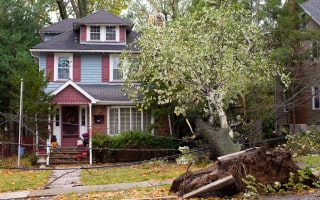Home Buying in Virginia

Whether you envision settling in a colonial-style home in a historic town, a sleek modern townhouse close to a thriving urban center, or a peaceful retreat in the rolling countryside, Virginia has something to offer every homebuyer. Known for its diverse landscapes, charming communities, and proximity to Washington, D.C., Virginia provides the perfect blend of metropolitan convenience and rural tranquility.
The Old Dominion, as it's called, offers a wide range of housing options that cater to a variety of lifestyles. Homebuyers can enjoy the best of both worlds: proximity to major cultural and employment opportunities in Northern Virginia and Washington, D.C., or the peaceful charm of areas like the Shenandoah Valley and Williamsburg. However, like many states, Virginia's housing market poses several challenges for homebuyers, including rising home prices and increased competition.
Virginia's real estate market has seen notable changes in recent years, particularly as the state becomes a top destination for homebuyers seeking a balance between quality of life and economic opportunity. As more people migrate from neighboring states for better job prospects or a lower cost of living, demand for housing has surged. This demand is particularly strong in Northern Virginia, where proximity to Washington, D.C., has driven up home prices and reduced inventory.
The median home price in Virginia, which hovers around $400,000, is above the national average, driven by the competitive market in Northern Virginia. However, more affordable options can be found in rural areas and smaller cities. Virginia remains a competitive seller's market, with properties selling quickly, often within weeks of being listed.
When purchasing a home in Virginia, it's important to get your finances in order, carefully consider factors like location and lifestyle, and work with a knowledgeable real estate agent who can help you navigate the state's diverse housing market to find the perfect home.
Current Virginia Housing Trends
Understanding Virginia's current housing trends is crucial for prospective buyers. Like other states, the housing market varies significantly based on region, economy, and demand.
-
Median Home Price
The median home price in Virginia is around $400,000, slightly above the national average. However, prices vary dramatically across the state. For example, in Northern Virginia, in and around Arlington and Alexandria, the median home price can be higher than $600,000 due to the area's proximity to Washington, D.C. On the other hand, smaller cities and rural areas, such as Roanoke or Blacksburg, offer more affordable options, with median home prices closer to $250,000.
-
Number of Homes Sold
On average, Virginia's housing market sees approximately 10,000 homes sold monthly. Northern Virginia dominates the market, but areas like Richmond and Virginia Beach also contribute a significant share of sales. As remote work grows in popularity, more buyers are looking at homes in quieter suburban or rural areas where they can get more space for their money.
-
Median Days on Market (DOM)
Virginia's average DOM figure is about 27 days. However, this number is lower in high-demand areas like Arlington, where homes may sell in as little as 15 days. In less competitive markets, such as Lynchburg or Danville, homes can remain on the market for 50 days or more, giving buyers more time to consider their options.
-
Housing Supply Statistics
Like many other states, Virginia is experiencing a housing supply shortage, particularly in urban and suburban regions. In Northern Virginia, inventory remains tight, creating a seller's market in cities like Alexandria and Fairfax. On the other hand, rural areas such as the Shenandoah Valley have more inventory available, offering homebuyers opportunities to purchase larger properties at lower prices.
How to Find the Right Home to Buy in Virginia

A local real estate agent with deep knowledge of the state's market is an essential partner when home-buying in Virginia. They can help you navigate the market, negotiate offers, and ensure you find a property that meets your needs. Be sure to choose a licensed local agent with strong communication skills, area experience, and strong references. You can also ask family and friends for referrals.
Choosing the Right Home
Several factors must be considered when searching for the perfect home in Virginia:
Location
Virginia's geography is incredibly diverse, offering everything from metropolitan living to rural serenity. Your choice of location will affect everything from commute time to school districts and access to amenities.
Consider these location factors:
-
Urban vs. Suburban vs. Rural: Northern Virginia is the state's urban hub, providing quick access to Washington, D.C., major employers, and public transportation. Suburban areas like Charlottesville and Norfolk offer a quieter lifestyle while maintaining access to jobs and cultural amenities. Rural areas like the Shenandoah Valley and Southern Virginia provide scenic views, lower home prices, and a more relaxed pace of life.
-
Proximity to Work: Virginia has a strong job market, particularly in government and defense, concentrated around the Washington, D.C. metro area. For those working in these sectors, proximity to Northern Virginia cities like Arlington and Falls Church can shorten commute times. Richmond and Norfolk also have thriving job markets, offering healthcare, finance, and education employment.
-
Public Transportation: Virginia has several public transportation options, including Virginia Regional Transit, which serves Culpeper, Warrenton, and Front Royal; the Williamsburg Area Transit Authority, which serves Williamsburg and the Historic Triangle; and the Washington Metropolitan Area Transit Authority, which serves Metro DC. Still, many Virginia residents rely on personal vehicles for commuting.
-
Property Taxes in Virginia: Virginia's property tax rates are relatively low, averaging around 0.8% of a home's value. However, property taxes can vary depending on the location, with urban areas like Fairfax County having higher rates than rural regions like Bedford County.
Type of Home
Virginia offers various home types to suit different needs and budgets. Whether you are looking for a single-family home in the suburbs or a condo in the city, there are plenty of options, including:
-
Single-Family Homes: Single-family homes are the most popular housing option in Virginia. These homes provide privacy and space, making them ideal for families. However, they come with added responsibilities and costs associated with routine maintenance and yard work.
-
Condominiums: Condos are common in urban areas like Arlington and Alexandria. They offer a low-maintenance lifestyle with access to shared amenities like pools and gyms. However, they typically come with monthly fees that must be considered when budgeting.
-
Townhomes: Townhomes offer more space than condos and require less maintenance than single-family homes. They are popular in suburban areas like Ashburn and Reston, providing a balance between space and convenience.
-
Manufactured and Modular Homes: These homes are common in rural Virginia. They are affordable alternatives to traditional homes, often offering similar living spaces at a lower cost.
-
Luxury Homes: Virginia has no shortage of luxury homes for those seeking high-end living, particularly in Northern Virginia. These homes often feature large living spaces, high-end finishes, and prime locations in exclusive neighborhoods.
The Typical Home Buying Process in Virginia
The home-buying process in Virginia typically follows these steps:
- Get a prequalification letter from your lender.
- Hire a local real estate agent.
- Make an offer on a home.
- Schedule a home inspection.
- Close on your new property.
Financing Your Home Purchase in Virginia

Depending on your financial situation and the type of property you're buying, there are several ways to finance a home purchase in Virginia. Homebuyers in the state can choose from traditional mortgages or government-backed loan programs, each offering distinct benefits.
![]() Traditional Mortgages
Traditional Mortgages
Traditional mortgages are a popular financing option for Virginia homebuyers, with two primary types available:
- Fixed-Rate Mortgages: These loans have a consistent interest rate throughout their life, making them a preferred choice for buyers seeking long-term stability and predictable payments.
- Adjustable-Rate Mortgages (ARMs): ARMs feature lower initial interest rates that can fluctuate based on market conditions. These loans are well-suited for buyers who plan to sell or refinance before the rate adjusts, but they come with the risk of higher payments down the road.
Several well-known lending institutions in Virginia, such as Atlantic Union Bank and Virginia Credit Union, offer competitive rates for fixed- and adjustable-rate mortgages. These lenders provide personalized service, helping buyers choose the loan option that best fits their needs.
![]() Government-Backed Loans
Government-Backed Loans
Government-backed loans offer qualified homebuyers significant advantages, such as lower down payment requirements and more flexible credit standards.
In Virginia, homebuyers may consider the following options:
- FHA Loans: Insured by the Federal Housing Administration, FHA loans allow for lower down payments and are ideal for first-time buyers or those with lower credit scores.
- VA Loans: Available to veterans and active-duty military personnel, VA loans typically require no down payment and offer competitive interest rates. This is a particularly attractive option for the large military community in Virginia, which includes bases such as Norfolk Naval Station and Fort Belvoir.
- USDA Loans: USDA loans are designed for buyers in rural and semi-rural areas. They offer no down payment and low interest rates. Many of Virginia's rural regions, including areas in the Shenandoah Valley and Southern Virginia, qualify for USDA loans, making them a great option for buyers in these locations.
![]() Down Payment Assistance Programs in Virginia
Down Payment Assistance Programs in Virginia
Virginia also offers several down payment and closing cost assistance programs to help make homeownership more accessible. The Virginia Department of Housing and Community Development and Virginia Housing provide first-time homebuyer downpayment and closing cost assistance programs.
Home Insurance in Virginia

While not required by law, most mortgage lenders in Virginia will require homebuyers to carry homeowners' insurance. The average annual cost of home insurance in Virginia is around $1,200, though this can vary significantly depending on the location and value of the property. In many parts of the state, especially inland, home insurance costs tend to be lower than the national average.
However, insurance premiums may be much higher for those purchasing homes along the coast or in areas prone to natural disasters like hurricanes due to the increased risk of damage from storms and flooding. Coastal homeowners may be required to purchase additional policies, such as flood insurance, which can add to the overall cost of coverage.
Home Buying Challenges in Virginia
Virginia homebuyers face several challenges when navigating the state's housing market, including:
-
Rising Home Prices and Competition: Due to limited inventory and strong competition, home prices have steadily increased in high-demand areas like Northern Virginia. This makes it difficult for first-time buyers and those with smaller budgets to find affordable homes, especially in urban and suburban markets.
-
Limited Housing Inventory: Like many other parts of the country, Virginia is experiencing a housing shortage, particularly in metropolitan regions such as Richmond and Northern Virginia. This shortage has increased prices and made the market more competitive, with fewer available properties for potential buyers.
-
Natural Disasters and Insurance Costs: Virginia is prone to natural disasters, especially hurricanes along the coast. Homebuyers in areas like Virginia Beach and the Eastern Shore may face higher home insurance premiums and the need for additional coverage, such as flood insurance, to protect their investments from potential storm damage.
Virginia Home Inspections
Virginia has some wild weather conditions, including tornadoes, thunderstorms, hurricanes, heavy winds, hail, and flooding rain, all of which can severely damage a house. That is why a Virginia home inspection is vital before purchasing. A home inspection can inform buyers of hidden defects, damage, and inoperable systems so they can address the issues before closing. A thorough home inspection gives buyers some options and crucial negotiating power if the report reveals severe issues.
A Virginia home inspection covers the house's structural integrity, primary systems, and safety issues. The list includes:
Structural Elements
-
Foundation: Checks the foundation for signs of crumbling, cracks, settling, or water damage.
-
Roof: Checks the condition of the shingles, flashing, gutters, vents, and chimney.
-
Exterior: Evaluates the siding, trim, windows, and doors for signs of wear or damage.
-
Interior: Checks the floors, ceilings, walls, stairs, doors, and windows.
Mechanical Systems
-
Plumbing: Checks the water pressure, pipes, fittings, and fixtures (toilets, tubs, sinks, etc.) for signs of leaks or damage.
-
Electrical: Checks the wiring, outlets, circuit breakers, and light fixtures to ensure everything is okay.
-
Heating, Venting, and Air Conditioning (HVAC): Tests the heating and cooling systems to ensure they are functional and safe.
Other Items
-
Insulation: Checks the amount and condition of attic and basement insulation.
-
Ventilation: Checks the ventilation systems to ensure they work correctly.
-
Appliances: Evaluates built-in and free-standing appliances that come with the home.
-
Yard: Checks the grading, drainage, driveway, porches, and decks.
-
Safety: Checks the smoke alarms, carbon monoxide detectors, sprinkler systems, and handrails for safety.
A Virginia home inspection costs between $300 and $600, depending on the house's size, age, and condition. It will cost more if the buyer wants extra tests performed (radon, lead paint, etc.). It costs an average of $400-$600 for a Virginia Beach home inspection.
The Process
In a Virginia real estate transaction, the buyer usually pays for the home inspection because it helps them assess the home's condition before purchase. The process looks like the following:
- Find a reputable, affordable home inspection firm.
- Schedule the inspection according to the contract terms as quickly as possible.
- Show up and ask questions. The inspection usually takes between 2.5 and 5 hours.
- Review the final report and decide what to do.
The top five home inspection companies in Virginia are:
- Safe House Property Inspections - Virginia Beach, VA
- Top Notch Inspection Services - Chesapeake, VA
- VA Home Inspect LLC - Chantilly, VA
- Square One Home Inspectors - Fairfax, VA
- Capitol Home Inspectors - Midlothian, VA
After the Inspection
After the inspection is complete, the inspector sends a copy of the final report to all relevant parties. The buyer then has some options on how to proceed. If the report shows serious issues that should be resolved, the buyer can:
- Try to save some money by negotiating a better price.
- Ask the seller to make all the necessary repairs before closing.
- They can back out of the sale and walk away without losing any money.
- Ask for a home warranty or lower down payment.
Inspection Top Cities
| City | Inspection Cost | Local Issues | Local Rules | Local Home Types |
|---|---|---|---|---|
| Home Inspection in Virginia Beach | $400-$900 depending on the size of the home and type of inspection. | Water damage, plumbing issues, electrical problems, and structural integrity issues. | Conducted according to the Virginia Uniform Statewide Building Code (USBC). | Single-family homes, condos, townhomes, and multi-family residences. |
| Home Inspection in Chesapeake | $400-$900 based on the size, age, and condition of the home. | Roofing problems, electrical, plumbing, structural issues, and HVAC problems. | Not mandatory by the city or lenders. | Single-family homes, condos, townhouses, and multi-family homes. |
| Home Inspection in Norfolk | $450-$900 based on the size and type of property. | Roof, HVAC systems, electrical wiring, plumbing, foundation, water damage, and termites. | Inspectors must be licensed by the Virginia Department of Professional and Occupational Regulation (DPOR). | Single-family homes, condominiums, and apartments. |
| Home Inspection in Richmond | $276-$600 based on the property type, size, and age. | Roof, HVAC, electrical systems, and plumbing. | Not mandated but strongly recommended. | Colonial, Revival, Cape Cod, Victorian, and others. |
| Home Inspection in Newport News | $400-$600 based on the property's size and location. | Roof, electrical, poor drainage, mold and moisture problems, and HVAC issues. | Inspections must focus on safety and compliance with the Virginia Maintenance Code. | Single-family homes, condos, townhouses, multi-family homes, and mobile homes. |
Navigating Virginia's Housing Market
When home buying in Virginia, you'll encounter a mix of challenges and opportunities, thanks to the state's varied regions and competitive markets. From the fast-paced real estate scene in Northern Virginia to the tranquil rural areas in the Shenandoah Valley, Virginia offers housing options for different preferences and lifestyles.
To successfully navigate Virginia's housing market, it's essential to understand the impact of location, property values, and market trends. Enlisting the help of an experienced local realtor is key to ensuring you get tailored advice based on your unique needs. Thorough research and preparation are also crucial, especially in high-demand areas where competition is fierce.
Although the Virginia market can be challenging, particularly for first-time buyers or those on a tight budget, the diverse housing options provide ample opportunities. With the right strategy, you can confidently find a home that fits your lifestyle and make a sound investment in the Old Dominion.
Instant Access to Virginia Property Records
- Owner(s)
- Deed Records
- Loans & Liens
- Values
- Taxes
- Building Permits
- Purchase History
- Property Details
- And More!